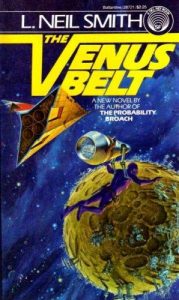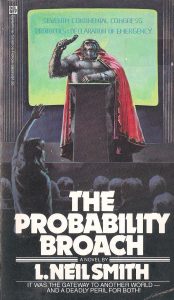 Once upon a time, science fiction wasn’t only published to gently massage the psyches of readers who are politically left of center. L. Neil Smith is an unashamedly libertarian author, best-known, sadly, I think, for writing the Lando Calrissian adventure novels back in the early 80s. (Which novels, by the way, I reviewed for SeqArt’s upcoming third volume of Star Wars essays.) Possibly his best-known original work is a novel called The Probability Broach. It’s a tale about alternate universes and traveling between them, and it establishes a world called The American Confederacy, a place where one word made all the difference in what happened to the nation that formed when the colonists revolted and broke away from England in 1776. That word was “unanimous.” In the American Confederacy, government power depends on the unanimous consent of the governed. You can imagine not a lot gets done by government in that America, which is exactly what libertarians are after. The Probability Broach also delightfully offers a solution to the question of nature vs. nurture. Its answer? Free will wins over them both.
Once upon a time, science fiction wasn’t only published to gently massage the psyches of readers who are politically left of center. L. Neil Smith is an unashamedly libertarian author, best-known, sadly, I think, for writing the Lando Calrissian adventure novels back in the early 80s. (Which novels, by the way, I reviewed for SeqArt’s upcoming third volume of Star Wars essays.) Possibly his best-known original work is a novel called The Probability Broach. It’s a tale about alternate universes and traveling between them, and it establishes a world called The American Confederacy, a place where one word made all the difference in what happened to the nation that formed when the colonists revolted and broke away from England in 1776. That word was “unanimous.” In the American Confederacy, government power depends on the unanimous consent of the governed. You can imagine not a lot gets done by government in that America, which is exactly what libertarians are after. The Probability Broach also delightfully offers a solution to the question of nature vs. nurture. Its answer? Free will wins over them both.
 This novel, one of several set in the American Confederacy is not as eye-opening as The Probability Broach. That bar was set pretty high. It’s solidly entertaining, though. For me, it’s just so nice to read a story where the villains are named “Hamiltonians.” If you didn’t know that I deplore Alexander Hamilton, you probably don’t know me very well. It offers one of the more creative comeuppances I’ve seen for the vile villains at the end, too. The title derives from the project the heroes undertake in the book—doing a little solar system re-engineering by turning Venus, a not particularly useful planet, into a second asteroid belt which can be mined for resources. Smith’s hero, Detective Win Bear, reflects on the morality of such a drastic change to the environment:
This novel, one of several set in the American Confederacy is not as eye-opening as The Probability Broach. That bar was set pretty high. It’s solidly entertaining, though. For me, it’s just so nice to read a story where the villains are named “Hamiltonians.” If you didn’t know that I deplore Alexander Hamilton, you probably don’t know me very well. It offers one of the more creative comeuppances I’ve seen for the vile villains at the end, too. The title derives from the project the heroes undertake in the book—doing a little solar system re-engineering by turning Venus, a not particularly useful planet, into a second asteroid belt which can be mined for resources. Smith’s hero, Detective Win Bear, reflects on the morality of such a drastic change to the environment:
“But, hell, all life has environmental impact, just by nature of its being. Intelligence manipulates its environment, purposefully, instead of the other way around. [Dissenters] to the contrary, to do less is to resign from being sentient. To denounce it is to renounce intelligence.
“Which, I suspect, was their point all along.”
